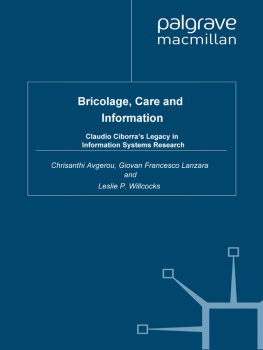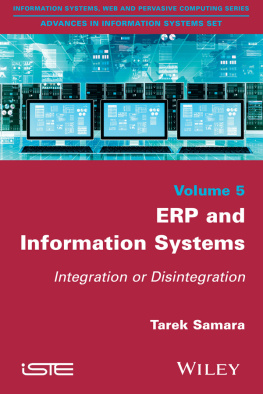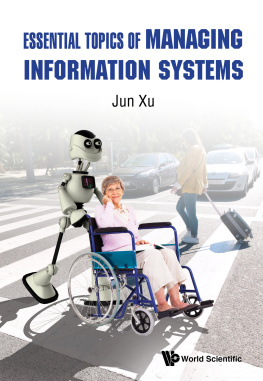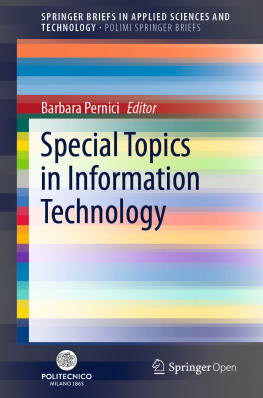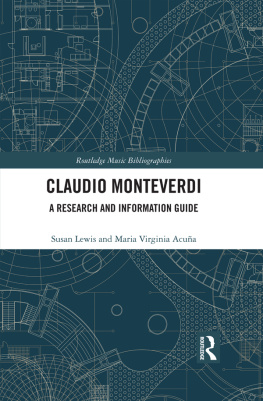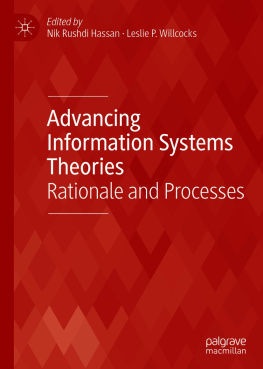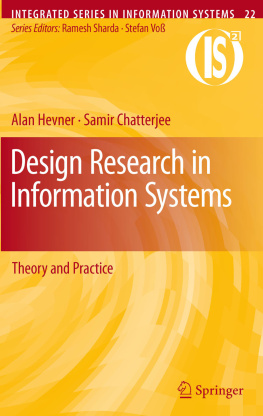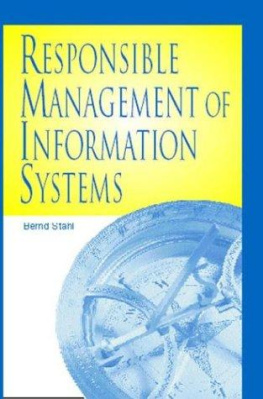Bricolage, Care and Information
TECHNOLOGY, WORK AND GLOBALIZATION
The Technology, Work and Globalization series was developed to provide policy makers, workers, managers, academics and students with a deeper understanding of the complex interlinks and influences between technological developments, including information and communication technologies, work organizations and patterns of globalization. The mission of the series is to disseminate rich knowledge based on deep research about relevant issues surrounding the globalization of work that is spawned by technology.
Also in the series:
GLOBAL SOURCING OF BUSINESS AND IT SERVICES
Leslie P. Willcocks and Mary C. Lacity
ICT AND INNOVATION IN THE PUBLIC SECTOR
Francesco Contini and Giovan Francesco Lanzara
EXPLORING VIRTUALITY WITHIN AND BEYOND ORGANIZATIONS
Niki Panteli and Mike Chaisson
KNOWLEDGE PROCESSES IN GLOBALLY DISTRIBUTED CONTEXTS
Julia Kotlarsky, Ilan Oshri and Paul C. van Fenema
GLOBAL CHALLENGES FOR IDENTITY POLICIES
Edgar Whitley and Ian Hosein
E-GOVERNANCE FOR DEVELOPMENT
Shirin Madon
OFFSHORE OUTSOURCING OF IT WORK
Mary C. Lacity and Joseph W. Rottman
OUTSOURCING GLOBAL SERVICES
Ilan Oshri, Julia Kotlarsky and Leslie P. Willcocks
BRICOLAGE, CARE AND INFORMATION
Chrisanthi Avgerou, Giovan Francesco Lanzara and Leslie P. Willcocks
Bricolage, Care and Information
Claudio Ciborras Legacy in Information Systems Research
Chrisanthi Avgerou, Giovan Francesco Lanzara and
Leslie P. Willcocks


Selection and editorial content Chrisanthi Avgerou, Giovan Francesco Lanzara and
Leslie Willcocks 2009
Individual chapters the contributors 2009
All rights reserved. No reproduction, copy or transmission of this publication may be made without written permission.
No portion of this publication may be reproduced, copied or transmitted save with written permission or in accordance with the provisions of the Copyright, Designs and Patents Act 1988, or under the terms of any licence permitting limited copying issued by the Copyright Licensing Agency, Saffron House, 6-10 Kirby Street, London EC1N 8TS.
Any person who does any unauthorized act in relation to this publication may be liable to criminal prosecution and civil claims for damages.
The authors have asserted their rights to be identified as the authors of this work in accordance with the Copyright, Designs and Patents Act 1988.
First published 2009 by
PALGRAVE MACMILLAN
Palgrave Macmillan in the UK is an imprint of Macmillan Publishers Limited, registered in England, company number 785998, of Houndmills, Basingstoke, Hampshire RG21 6XS.
Palgrave Macmillan in the US is a division of St Martins Press LLC, 175 Fifth Avenue, New York, NY 10010.
Palgrave Macmillan is the global academic imprint of the above companies and has companies and representatives throughout the world.
Palgrave and Macmillan are registered trademarks in the United States, the United Kingdom, Europe and other countries.
ISBN-13: 9780230220737 hardback
ISBN-10: 0230220738 hardback
This book is printed on paper suitable for recycling and made from fully managed and sustained forest sources. Logging, pulping and manufacturing processes are expected to conform to the environmental regulations of the country of origin.
A catalogue record for this book is available from the British Library.
A catalog record for this book is available from the Library of Congress.
10 9 8 7 6 5 4 3 2 1
18 17 16 15 14 13 12 11 10 09
Printed and bound in Great Britain by
CPI Antony Rowe, Chippenham and Eastbourne
Illustrations
Tables
Figures
Preface
Claudio Ciborra was one of the most innovative thinkers in the field of information systems. He was one of the first scholars who introduced institutional economics in the study of IS; he elaborated new concepts, such as the platform organization; and he contributed to the development of a new perspective altogether to the study of information systems through Heideggerian phenomenology. His untimely death left this work scattered in journals, edited books, conference proceedings, and some still unpublished.
This book contains some of the most seminal work of Claudio Ciborra and work of other authors who were inspired by this work and built on it. It is composed of three parts:
The introduction, by Giovan Frencesco Lanzara, takes the reader through the unfolding of Ciborras thought and elaborates on the main themes of his work, namely socio-technical systems, institutional economics of information systems, IT and organizational learning, and finally his phenomenological analyses of information systems.
The first part of the book contains 11 of Claudio Ciborras publications, selected by the editors to convey best the development of his work; it includes articles on all the thematic categories identified at the introduction, though the largest category is on his phenomenological work, which, we believe, was his most significant contribution.
The second part contains eight articles by other authors whose research was founded on Ciborras ideas:
In Knowledge: Climbing the Learning Ladder TO A Phenomenological View Andrea Resca points out that questions of epistemology have been a constant preoccupation in Ciborras work, from his writings on transaction costs to his phenomenological analyses. He thus traces the thread that connects his analyses of knowledge and rationality in economic and administrative behaviour, of knowledge, learning and organizational strategy, and of improvisation and situated action.
In Hospitality, Improvisation and Gestell: A Phenomenology of Mobile Information, Martin Brigham and Lucas Introna provide a clear presentation of these three concepts and demonstrate the way they can enhance our understanding of IS and organizational change by using them to examine changes that occurred in the practice of a fire brigade in the UK when they started using mobile data systems.
In The Hospitality Metaphor AS A Theoretical Lens to Understand the Process of ICT Adoption Saccol and Reinhard discuss hospitality as a new approach for ICT adoption that departs from positivist models. They trace the philosophical origins of this metaphor and its emergence in the IS field mainly through Ciborras work and they apply it to gain insights on a case study of a Brazilian Bank that equipped its employees with mobile technology.
Amany Elbannas paper The Validity of the Improvisation Argument in the Implementation of Rigid Technology: The Case of ERP Systems draws on Ciborras work on improvisation and drift. She examines whether these concepts are relevant and valid for ERP projects, which are generally understood as rigid and therefore in need of careful planning. She combines Ciborras ideas with an Actor Network Theory (ANT) analysis to argue that improvisation, bricolage and drift are constituent processes of highly structured projects of rigid technology.
Edgar Whitley and Mary Darking, in Object Lessons and Invisible Technologies examine the nature of technology artefacts a longstanding theme in IS research by contrasting ideas stemming from recent research in the ANT perspective and Ciborras phenomenology. They use a European Union project that aims at developing a new technological infrastructure to demonstrate the explanatory capacity of these perspectives and emphasize the significance of the concept of G
Next page
